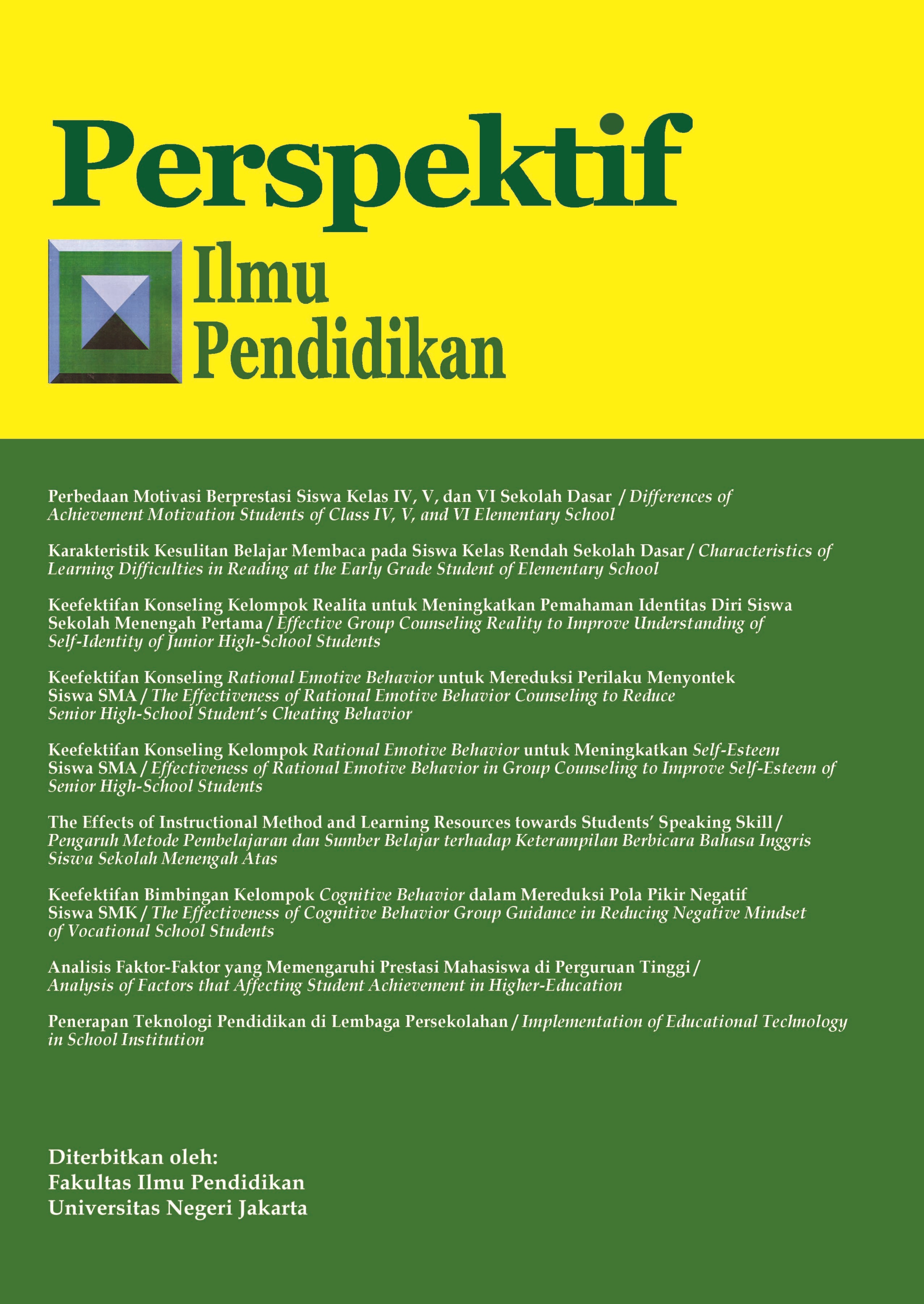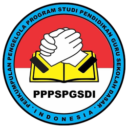KEEFEKTIFAN KONSELING RATIONAL EMOTIVE BEHAVIOR UNTUK MEREDUKSI PERILAKU MENYONTEK SISWA SMA
DOI:
https://doi.org/10.21009/PIP.322.4Keywords:
rational emotive behavior counseling, cheating behavior, high-school studentsAbstract
This study aims to apply rational emotive behavior counseling as an effort to reduce cheating behavior of high school students. The design of this study was conducted using a quasi experimental method approach with a pretest-posttest non-equivalent control group design research design. Data analysis techniques using Wilcoxon mached-pairs signed test, with the Asymp.Sig (2-Tailed) 0.028 <0.05, which shows a significant difference. The Z test value is -0.730 with the Asymp.Sig (2-Tailed) number 0.466, because of the Asymp.Sig (2-Tailed) value> 0.05, it can be concluded that there is no significant difference between the posttest value and the experimental group value with the control group, Ho is rejected and Ha is accepted which means that rational emotive behavior counseling is effective in reducing student cheating behavior. The study was carried out starting from January to March 2018, which took place at Darul Hikmah High School. Based on the results of the study, the researchers proposed several suggestions, among others (1) BK teachers, counseling rational emotive behavior can be applied by BK teachers to reduce student cheating behavior practically and can be easily applied; (2) for researchers furthermore, this research uses the pretest and posttest control group design research models, for the next researcher can use other research designs such as action research in BK, or other experimental research.
References
Andrestia, M. (2010). Pengaruh locus of control goal orientation terhadap cheating mahasiwa Fakultas Psikologi UIN Syarif Hidayatullah Jakarta. Skripsi. Jakarta: UIN Syarif Hidayatullah Jakarta.
Anitasari, L. (2012). Hubungan stres dan perilaku merokok pada remaja. Skripsi. Malang: Universitas Negeri Malang.
Arabzadeh, S., Ameli, N., Zeinoddini, A., Rezaei, F., Farokhnia, M., Mohammadinejad, P., Ghaleiha, A., & Akhondzadeh, S. (2015). Celecoxib adjunctive therapy for acute bipolar mania: A randomized, double-blind, placebo-controlled trial. Bipolar Disorders, 17(6), 606-614. doi:https://doi.org/10.1111/bdi.12324
Bond, F. W., & Dryden, W. (1996). Why two central REBT hypotheses appear untestable. Journal of Rational-Emotive and Cognitive-Behavior Therapy, 14(1), 29-40.
Corey, G. (2015). Theory and practice of counseling and psychotherapy. Canada: Nelson Education.
Corey, G. (2012). Case approach to counseling and psychotherapy. Canada: Nelson Education.
Dessy, D. A., Suranata, K. S., & Setuti, N. M. (2013). Penerapan konseling rasional emotif dengan teknik kognitif untuk meningkatkan self disclosure siswa kelas X. 6 SMA Negeri 1 Sukasada tahun pelajaran 2012/2013. Jurnal Ilmiah Bimbingan Konseling Undiksha, 1(1), 1-10. https://ejournal.undiksha.ac.id/index.php/JJBK/issue/view/91
Dryden, W. (2014). Rational emotive behaviour therapy: Distinctive features. London: Routledge.
Dryden, W. (2003). Reason to change: A rational emotive behaviour therapy (REBT) workbook. London: Routledge.
Fraenkel, J. R., Wallen, N. E., & Hyun, H. H. (1993). How to design and evaluate research in education (Vol. 7). New York: McGraw-Hill.
Habsy, B. A. (2017a). Model konseling kelompok cognitive behavior untuk meningkatkan self esteem siswa SMK. Perspektif Ilmu Pendidikan, 31(1), 21-35. doi: https://doi.org/10.21009/PIP.311.4
Habsy, B. A. (2017b). Filosofi ilmu bimbingan dan konseling indonesia. Jurnal Pendidikan (Teori dan Praktik), 2(1), 1-11. doi: http://dx.doi.org/10.26740/jp.v2n1.p1-11
Habsy, B. A. (2018a). Konseling rasional emotif perilaku: Sebuah tinjauan filosofis. Indonesian Journal of Educational Counseling, 2(1), 13-30. doi:https://doi.org/10.30653/001.201821.25
Habsy, B. A. (2018b). Model bimbingan kelompok PPPM untuk mengembangkan pikiran rasional korban bullying siswa SMK Etnis Jawa. Jurnal Pendidikan (Teori dan Praktik), 2(2), 91-99. doi:http://dx.doi.org/10.26740/jp.v2n2.p91-99
Hartanto, D. (2012). Bimbingan & konseling menyontek: Mengungkap akar masalah dan solusinya. Jakarta: Indeks.
Hetherington, E. M., & Feldman, S. E. (1964). College cheating as a function of subject and situational
variables. Journal of Educational Psychology, 55(4), 212.
McCabe, M., & Ricciardelli, L. (2001). Parent, peer and media influences on body image and strategies to both increase and decrease body size among adolescent boys and girls. Adolescence, 36(142), 225-240. https://www.questia.com/library/journal/1G1-79251794/parent-peer-and-mediainfluences-on-body-image-and
Nurmayasari, K., & Murusdi, H. (2015). Hubungan antara Berpikir Positif dan Perilaku Menyontek pada Siswa Kelas X SMK Koperasi Yogyakarta. Empathy: Jurnal Fakultas Psikologi, 3(1), 8-15. http://journal.uad.ac.id/index.php/EMPATHY/ article/view/3009/1748
Santrock, J. W., & Curl, R. M. (2003). Adolescence (9th ed.). New York: McGraw-Hill.
Setyani, U. (2007). Hubungan antara konsep diri dengan intensi menyontek pada siswa SMA Negeri 2 Semarang. Disertasi. Semarang: Universitas Diponegoro.
Sujana, Y. E., & Wulan, R. (1994). Hubungan antara kecenderungan pusat kendali dengan intensi menyontek. Jurnal Psikologi, 21(1994). http://i-lib.ugm.ac.id/jurnal/download.php?dataId=4298
Taylor, K.R. (2003). Bracing for cheating and plagiarism. Diakses melalui https://www.eddigest.com/
sub.php
Permatasari, D., & Muka, J. R. (2017). Correlation between self–efficacy and cheating behavior on
vocational high school students. Prosiding 8th ICLICE 2017.
Valiente, C., Eisenberg, N., Haugen, R., Spinrad, T. L., Hofer, C., Liew, J., & Kupfer, A. (2011). Children’s efforftul control and academic achievement: Mediation through social functioning. Early Education and Development, 22(3), 411-433. doi: https://doi.org/10.1080/10409289.2010.505259
Downloads
Published
How to Cite
Issue
Section
License
Authors who publish with this Journal agree to the following terms:
- Author retain copyright and grant the journal right of first publication with the work simultaneously licensed under a creative commons attribution licensethat allow others to share the work within an acknowledgement of the work’s authorship and initial publication of this journal.
- Authors are able to enter into separate, additional contractual arrangementfor the non-exclusive distribution of the journal’s published version of the work (e.g. acknowledgement of its initial publication in this journal).
- Authors are permitted and encouraged to post their work online(e.g. in institutional repositories or on their websites) prior to and during the submission process, as it can lead to productive exchanges, as well as earlier and greater citation of published works.
-
Users/public use of this website will be licensed to CC BY-NC-SA Creative Commons Attribution-NonCommercial-ShareAlike 4.0 International License












